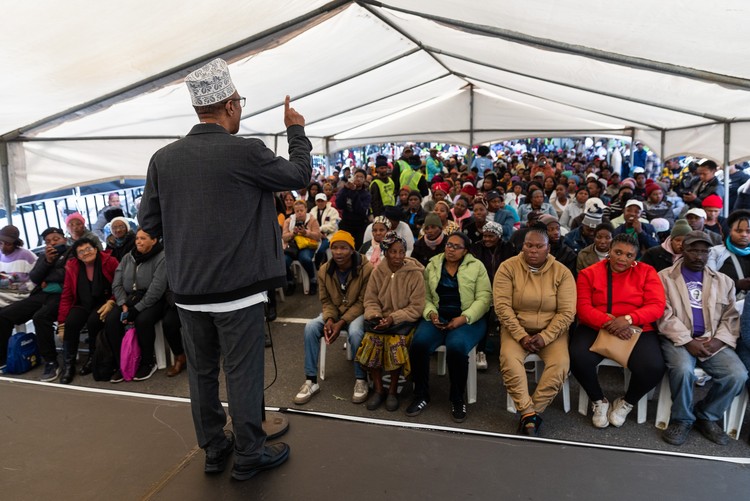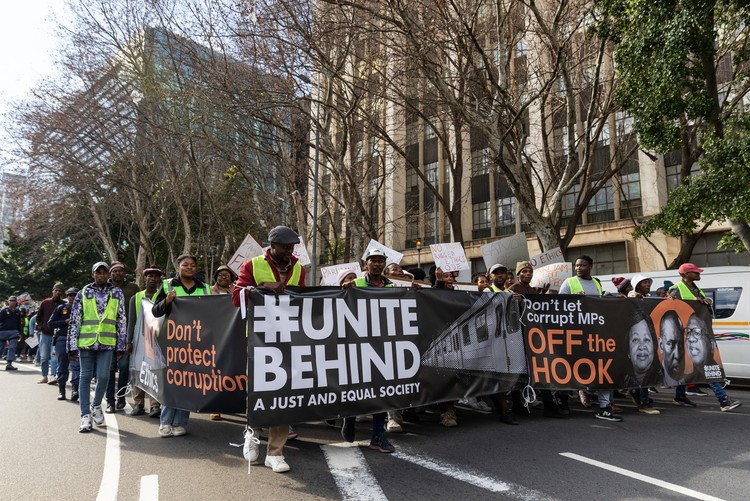Parliament sued for letting corrupt MPs off the hook
#UniteBehind argues that changes to Parliament’s code of conduct allow MPs implicated in state capture to evade accountability
Hundreds of #UniteBehind supporters sat in a marquee outside Parliament on Tuesday. Imam Rashied Omar told the protesters that they were gathering as citizens who love their country dearly and will not stand by while “corruption robs our children of their future”. He said that Parliament’s code of conduct is a “shield for corruption”.
- A court challenge to Parliament’s code of conduct was heard before a full bench of the Western Cape High Court on Tuesday.
- Commuter activist group #UniteBehind says an amendment to the code — introduced underhandedly without public participation while the organisation was litigating against Parliament — should be declared unconstitutional.
- The amended code allows MPs who resign after being implicated in ethics breaches to evade further scrutiny from Parliament’s Joint Ethics Committee.
- The amended code also includes secrecy provisions that #UniteBehind opposes.
- Parliament’s lawyer argued that the amendment is necessary to comply with the Protection of Personal Information Act.
#UniteBehind activists protested outside Parliament on Tuesday. The activist group has taken Parliament’s Registrar and Joint Ethics Committee to court, challenging Parliament’s new Code of Conduct.
In 2022, #UniteBehind laid complaints in terms of Parliament’s code of conduct against six ANC MPs who were implicated in state capture, including grand-scale corruption at the Passenger Rail Agency of South Africa (PRASA). They were Fikile Mbalula, Mosebenzi Zwane, Joe Maswanganyi, Dikeledi Magazi, Sfiso Buthelezi, and Dipuo Peters.
In April 2023, #UniteBehind started litigation against the committee for failing to act “diligently”, accusing the committee of “an unreasonable, and unexplained, delay in handling the complaints”.
The organisation amended its notice of motion in February this year after discovering that an amended code of conduct had been adopted. #UniteBehind claims this was done without public participation and without alerting them.
The case was heard on Tuesday before a full bench in the Western Cape High Court: Judge Lister Nuku, Judge Hayley Slingers, and Acting Judge Jonker.
Gregory Solik, the advocate representing #UniteBehind, told the court the new Code of Conduct was unconstitutional, since it was introduced during the course of the litigation.
#UniteBehind argued that it constituted an “attempt to circumvent judicial scrutiny”. When #UniteBehind prepared and filed its final affidavit, it was not informed by Parliament that the code of conduct had been amended and implemented.
Solik also argued that if the challenge to the code of conduct is dismissed, then the court should declare the “no-jurisdiction clause” invalid. This new clause allows MPs to resign to avoid disciplinary action against them.
The amended code states that the Ethics Committee does not have “jurisdiction” to consider a complaint if the member ceases to be an MP. Also, if the committee is considering a complaint against a former MP, then it may not proceed with the complaint and “must close the complaint file”.
Solik argued that making this clause invalid would ensure that former MPs implicated in corruption can be held accountable by Parliament — Parliament could still complete investigations and refer matters to the NPA. “It may be a small measure of justice, but that justice can still be enforced,” said Solik.
#UniteBehind further argued that the “secrecy provisions” of the new code of conduct should be declared unconstitutional. This includes a clause that “all documents, evidence and information in the possession of the Registrar must … remain confidential”, as well as another clause stating that meetings considering “the recommendation report of the Registrar will be closed to the public and non-Committee Members”.
But the respondents argued that #UniteBehind was trying to “revive a case that was dead”, said advocate for Parliament Zinzile Matebese.
About 100 #UniteBehind supporters marched from the Cape Town Civic Centre to Parliament in support of the organisation’s court case. Several hundred more people joined the protest at Parliament.
In an answering affidavit, Anthea Gordon, Registrar of Members’ Interests in Parliament, said that #UniteBehind’s amendment to its notice of motion, challenging the new Code of Conduct, was “disingenuous” and “an abuse of the court process”. Parliament asked the court to reject #UniteBehind’s request.
The respondents argued that the process to amend the code started in 2022 and culminated with the adoption of the amended code by the National Assembly in May 2024. They added that it “was never adopted in haste as suggested by the applicants”, nor was it kept secret.
Matebese argued that confidentiality of the information clauses was important as it “might result in unintended consequences for the whole committee” if it were removed. The confidentiality clauses were necessary to protect MPs’ information, and the information of their spouses’ affairs, which is protected under other legislation such as the Protection of Personal Information Act.
In his closing statement, Solik noted that the initial complaints were made because of the “total abdication of responsibility by Parliament” to address the rot at PRASA. He encouraged the court “not to lose sight of what the complaints were about”, which is that people are “subject to violence on a daily basis when they use public transport”.
Judge Nuku reserved judgment.
Protest outside Parliament
About 100 #UniteBehind supporters marched from the Cape Town Civic Centre to Parliament, holding placards stating “No more rigged ethics code”, “Don’t protect corruption” and “No ethics. No Justice. No accountability”. The march ended outside Parliament, where a marquee was set up and several hundred more people joined the protest.
Support independent journalism
Donate using Payfast

Don't miss out on the latest news
We respect your privacy, and promise we won't spam you.
Next: One murder, two court cases: chaos at Cape Town court
Previous: Outcry over cuts to Cape Town’s Dial-a-Ride service
© 2025 GroundUp. This article is licensed under a Creative Commons Attribution-NoDerivatives 4.0 International License.
You may republish this article, so long as you credit the authors and GroundUp, and do not change the text. Please include a link back to the original article.
We put an invisible pixel in the article so that we can count traffic to republishers. All analytics tools are solely on our servers. We do not give our logs to any third party. Logs are deleted after two weeks. We do not use any IP address identifying information except to count regional traffic. We are solely interested in counting hits, not tracking users. If you republish, please do not delete the invisible pixel.


